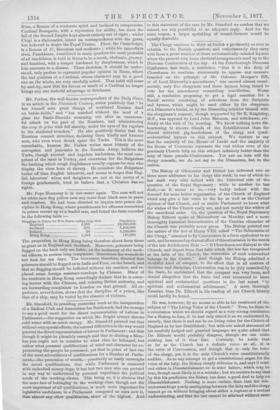The Bishop of Gloucester and Bristol has delivered two or
three more addresses to his clergy this week, in one of which he has dealt very ably indeed with the historical side of the question of the Royal Supremacy ; while in another he has dealt,—as it seems to us,—very feebly indeed with the demand for some better organisation of the Church of England which may give a fair voice to the lay as well as the Clerical opinion of that Church, and so enable Parliament to know what the wishes of the Church really are, and not merely the wishes of the sacerdotal order. On the question of the Royal Supremacy Bishop Ellicott spoke at Malmesbury on Monday, and a more thoroughly historical demonstration of the Erastian character of' the Church was probably never given. The Bishop pointed out the nature of the Act of Henry VIII. called "The Submission of the Clergy," assented to by Convocation in a form equivalent to an oath, and he summed up the real effect of this submission in the words of the late Archdeacon Hale :—" If Churchmen are disloyal to the Church, and depart from that faith which the law has recognised as the faith of the Church, the correction of such misconduct belongs to the Crown." And though the Bishop admitted a doubtful kind of compact, to the effect that in all matters of doctrine and discipline, Convocation was to be duly consulted by the State, he maintained that the compact was very loose, and denied altogether that the State had ever consented to leave spiritual and ecclesiastical questions in the last resort "to spiritual and ecclesiastical arbitrament." A more thorough Erastian than Dr. Ellicott in his reading of our Church history could hardly be found.


































 Previous page
Previous page